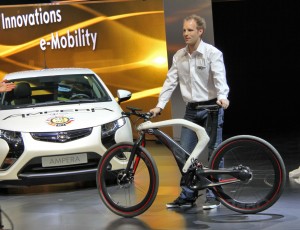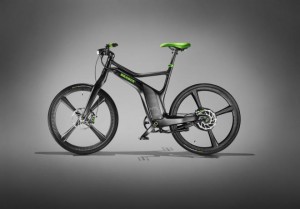Opel is returning to its roots. The German brothers that gave the General Motors subsidiary its name started out making sewing machines but soon expanded into a more lucrative business building bicycles. In fact, founding brother Adam Opel didn’t even live long enough to see the company add automobiles to its product portfolio.
Cars have long been the heart of Opel’s business, but the maker plans to add the new RADe to its line-up, hoping to take advantage of booming demand for electric bikes. The new model, which went on display this week at the Geneva Motor Show can yield up to 90 miles range per charge at speeds up to 25 mph, Opel officials noted.
While cars still dominate the annual Geneva event, Opel wasn’t the only automaker showing off a battery-based bike. Daimler AG’s Smart brand rolled out a black-and-green model developed by the European tuner house Brabus – better known for the high-performance versions of Mercedes-Benz products it has developed over the years.
The Geneva Motor Show has long shown a green streak, with dozens of specialty manufacturers and mainstream automakers alike revealing battery-based automobiles. But the Opel and Smart eBikes were more than just publicity stunts. Both makers are betting there’s a serious business opportunity available.
“Absolutely yes,” said Opel CEO Karl-Friedrich Stracke, in an interview following the maker’s Geneva news conference. There are millions of them in use around the world, and Opel, he explained, believes it could do well by marketing eBikes designed and produced using advanced automotive technology.
By various industry estimates, there were as many as 120 million eBikes in use in China by the end of 2010, the largest market for the technology, with millions more in other markets. There’s been particularly strong growth in emerging countries, where battery bikes are an affordable alternative to the automobile – and something that is easier to maneuver in traffic-snarled cities like Bangkok, Manila and Bombay.
But there’s growing demand in more established markets in Europe and North America, as well, estimates indicating that European sales surged from 200,000 in 2007 to 700,000 just three years later.
“The worldwide electric two-wheel vehicle market is expected to grow at a compound annual rate of 9% through 2016,” according to a study by PikeResearch. The consulting firm cautions that in the U.S. sales are only being limited by “a lack of an established retail channel,” but availability is rapidly improving.
BestBuy, for example, now offers eBikes at more than a score of its stores, many along the environmentally conscious West Coast. In New York, NYCeWheels, which opened its doors in 2001, now has a number of competitors appealing to urbanites who can carry an eBike back to their apparent and skip the lease on an automobile parking space that might run hundreds, even thousands of dollars a month.
Even so, with sales of around 250,000 annually, U.S. eBike sales lag well behind China. In some parts of that country, regulators are actually trying to promote the technology as an alternative to automobiles. That’s especially true in Shanghai and Beijing, where traffic-snarled highways have led regulators to implement such steps as lotteries for car registrations. There are no such limits on battery bicycles.
Meanwhile, a new study could lend support to that strategy. While China has been promoting a switch to electric vehicles, the report by the University of Tennessee, University of Minnesota, and China’s Tsinghua University finds that battery cars are actually less green than they appear. That’s because of the booming country’s dependence on electric generators largely fueled by dirty coal.
The study found electric vehicles are actually more polluting than gas-powered vehicles in most of China — but highly efficient eBikes are cleaner than the alternatives.
Calling the eBike boom in China, “the single largest adoption of alternative fuel vehicles in history,” the study suggest they’re a plus for the country’s environment by taking motorcycles and mopeds off the road and delaying the switch to automobiles.
The vast bulk of battery bikes are produced by specialty makers — even former Chrysler CEO Lee Iacocca got into business after his retirement from the auto industry. But Opel and Smart are among a handful of automotive manufacturers who are hoping they can take a profitable share of the business — if not dominate the fast-growing eBike market.


